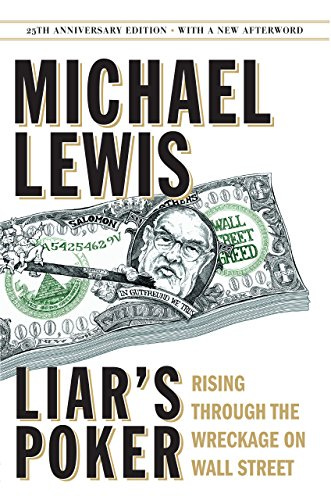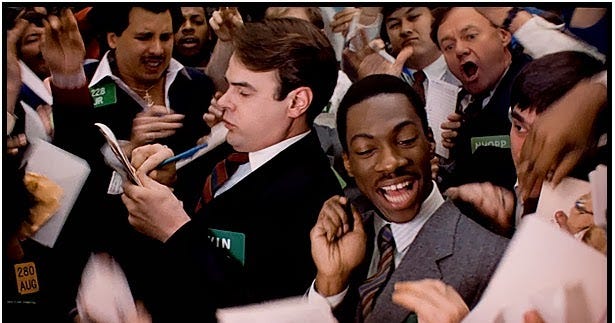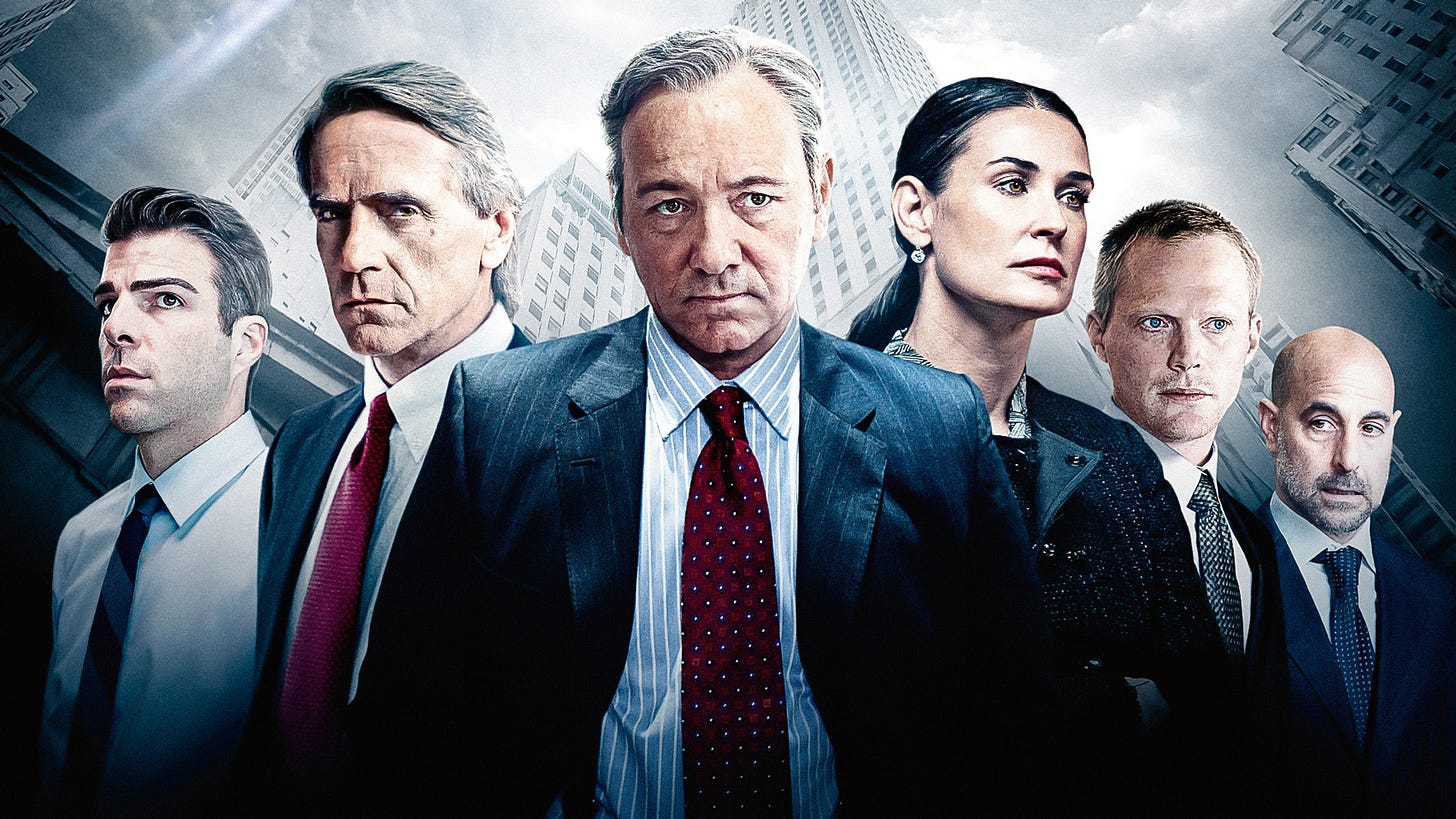Does Wall Street Need New Storytelling?
If all you offer is money, all you get are mercenaries.
A few months ago, Michael Lewis was asked about the enduring popularity of his ‘80s Wall Street epic Liar’s Poker. Lewis painted a contrast between today’s sanitized corporate environment and his experience of the Salomon trading floors with its rowdy traders and their screaming and food frenzies.
Compared to that boisterous era of greed and excess, “Wall Street has gotten so dull,” he said. “It is essentially a tech job. It is totally silent. For better or worse, it's lost a lot of its color.”
But wait, has he not written two books about Wall Street recently, The Big Short and Flash Boys? “Both of those books,” he continued, “depended on outsiders crashing in on the system. It would have been very hard, I felt, to have brought the system itself to life, because it felt kind of dead.”
It’s true: investment banks are now public corporations populated by Ivy League MBAs and quants. Academics and technology displaced the street-smart traders who, as Lewis wrote, “may not have been to school, but have Ph.D.’s in man’s ignorance.” We can follow this draining of color in Wall Street’s depiction in movies and TV.
Trading Places (1983) thrived on the madness of the trading pit, “The last bastion of pure capitalism left on earth.”
Wall Street (1987) portrayed the takeover tycoons making fortunes attacking the corporate establishment and tearing apart undervalued companies (and using insider information in the process).
The Wolf of Wall Street was a fun throwback to the dazzling dotcom days. But it portrayed fraudsters shilling penny stocks, not serious players of the game. Today, Billions draws its drama from the cat and mouse game between a master of the universe and a prosecutor-turned-politician. It portrays a system that is at least morally dead.
The best example, the epitome of what Lewis described, is Margin Call (2011). It is my favorite depiction of investment banking culture and mannerisms as I experienced them a decade ago. A rocket scientist-turned risk manager discovers that the portfolio of subprime securities is about to sink the bank.
Over the course of one night, the bad news gets delivered up the chain of command until it reaches the banks executive suite. The drama is understated, just like the outfits worn by the super predators inhabiting the bank’s upper echelon. It is derived from the movie’s high stakes: power and survival.
Take the call placed to the head of the trading desk early on:
“I think you need to get back here.”
“What?”
“Sam, listen...”
“It's 11:00 at night.”
“I'm well aware of the fucking time, Sam. I'm telling you, you need to see this.”
“See what?”
“It's...”
“E-mail it to me.”
“I don't think that that would be a good idea.”
“I'm on my way.”
The movie’s connection to the world of Liar’s Poker is the bank’s CEO, played by the phenomenal Jeremy Irons. “Please, speak as you might to a young child, or a golden retriever,” he asks the young risk manager representing the new generation.
Compensation Culture
A similar institutionalization has happened on the buyside. Once entrepreneurial buyout partnerships have turned into alternative asset management behemoths. And starting your own hedge fund has become a bad bet for most. Goldman Sachs reported that after 6-7 years, a mere half of funds remain up and running. Capital is flowing to what Sebastian Mallaby called the “new alpha factories”: multi-strategy hedge funds.
It works well for institutional allocators who seek scalable and more predictable return streams. And portfolio managers still have the opportunity to earn impressive amounts of money. But they are no longer in control of their culture or destiny. “With individual managers less visible to clients,” wrote Nishant Kumar, “those who start losing … can have their assets cut at best, and at worst can be fired on the spot.”
The dominance of large institutions puts all emphasis on the business of investing at the expense of the craft.
Take a few recent books for examples of culture. The Caesar’s Palace Coup on Apollo: “cutthroat” and “a dysfunctional family with all that implies.” The Bond King on PIMCO: “a pressure cooker kept just below the boiling point.” Black Edge on SAC/Poin72: “the need to hire new traders … became an almost unmanageable challenge … getting a job at SAC was like pulling the pin out of a grenade: It wasn’t a question of if you would blow up, it was a matter of when”.
Which brings us back to Michael Lewis: “It's very hard to persuade a young person that this is a fun job. It's a job that pays you well. It's just even more soul-depleting than it was.”
I can hear you protest: “Who cares if they’re not having fun.” As Don Draper said when confronted about never saying thank you: “that’s what the money is for!”
Which is exactly how it works at many firms. It’s all about compensation.
To be fair: It seems to work, at least for the largest and most successful firms. There is no shortage of applicants at Goldman Sachs. At PIMCO, “the extreme unpleasantness was the cost of fatter paychecks than almost anywhere else.” At SAC “there was no shortage of eager candidates. … The money that could be made was magnitudes greater than anywhere else.”
But I believe it’s problematic.
First off, Wall Street faces more competition for talent than ever before. Large tech companies have enormous financial firepower and can offer more comfortable work environments. Venture firms invest in media and PR teams that shower their portfolio companies, founders, and employees with positive attention. Startups offer a chance at equity upside and, typically, a meaningful mission. Perhaps near-term compensation is lower, but there is at least a conceivable long-term path to autonomy and ownership.
Second, a one-dimensional culture built around compensation strikes me as fragile and highly susceptible to envy. It is bound to experience a crisis when others earn similar amounts of money (or more!) faster and while having fun. “The wealth reeled in by elite traders and dealmakers is getting outshined by the quick riches touted by cryptocurrency fanatics, fintech whizzes and meme stocks,” Max Abelson at Bloomberg wrote in December 2021.
“There’s always somebody doing better than you,” the founder of a high-frequency trading firm commented. “Everyone compares themselves to those people.”
In Margin Call, the CEO asks Sam, his veteran trader, to dump the toxic portfolio in a fire sale. To compensate for this career-ending move, Sam is offered a one-time bonus. He answers:
"I'll do it John, but not because of your little speech. But because I need the money. Hard to believe after all these years. But I need the money."
The scene captures the essence of a firm with money culture. People stick around as long as they have to. But they will leave if offered more across the street. Are they effective at their jobs? Absolutely. But they don’t see their work as part of a greater mission. It’s just another year of doing what needs to be done to get to the bonus. If all you offer is money, all you get are mercenaries.
Lewis documented this cultural change in Liar’s Poker. In the closing chapter he wrote that it was becoming “abundantly clear that the money game rewarded disloyalty. The people who hopped from firm to firm and, in the process, secured large pay guarantees did much better financially than people who stayed in one place.”
Investing in Storytelling
Max Levchin once explained how startups should recruit top engineers.
“To win,” he said, “you need to tell a story about cogs. At Google, you’re a cog. Whereas with me, you’re an instrumental piece of this great thing that we’ll build together. Articulate the vision. Don’t even try to pay well. It’s not about cash. It’s about breaking through the wall of cynicism.”
This is why I believe we will see a renaissance of storytelling driven by the new generation of investment firms. They need to find talent, investors, and partners in a world dominated by massive incumbents. They can’t compete on money alone. And they shouldn’t. Instead, they are in a unique position to leverage content and social media to build networks, collaborate, share in the public sphere, and tell their stories.
Lewis might be right that the system is stale. But that just means it is ripe to be re-imagined and its rigidity is bound to be exploited.
However, I also believe he is missing something. The game of markets is as interesting, challenging, and alive as it has ever been. Today’s players are more diverse, more online, more global. But they follow the same instincts and ambitions, and they wrestle with the same emotions, as previous generations.
Perhaps their game has become too abstract and quiet for the big screen. Absent a crisis, scandal, or reckless exuberance it is not exciting enough for mass entertainment. But their work has become more challenging and interesting because the world is more complex and the game much more competitive.
Just consider the hubris of anyone setting out to test their wit and will against the market’s collective wisdom. Imagine the odyssey of their career as they set sail. Put yourself on the deck of their vessel as they steer through storms in search of treasure. Contemplate the many ships they watched sink to the bottom of the sea. There is no way their adventure won’t spawn good stories.
In Margin Call, Sam stuck around “not because of the speech,” but for the money. But the people you really want by your side on your journey, as clients, partners, and team members, don’t join for money alone. They want to know why they should care. Why your mission is important, what challenges you face, and what interesting questions you are trying to solve.
They want to know whether you’re building your world out of more than money and whether they would feel proud to be a part of your story.









Stories, bio and track record (execution) showcase the investor's set of principles. For example, Berkshire's out-performance is rooted in its culture, as it's key in their superior decision-making, but it needs no introduction. However, for a funds manager who's only starting, stories are the only way to convince of commitment to selected approach, prove the evolution of thinking, how ideas originate.
In any investment, having a strategy is always beneficial. And outside of HFT world, clients need to be convinced about the strategy and therefore how it originated, how manager came to it. Long-term returns require due diligence and sticking to the system, which should be well-defined in investor's head (if not shared with clients, which isn't always viable). Stories prove others that you are consistent in your thinking, and therefore investment approach.
In thematic investing such as ESG, it's key for clients and manager to achieve trust to agree on principles, so even more necessary to prove interest, present ideas, form + defend position on issues, themes, sectors, companies, etc. Digital medium allows for superior networking (matching on views) in that regard.
I've probably watched Margin Call 20 times - fantastic movie. Catching up on my backlog - keep the great posts coming.